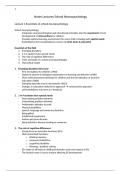College aantekeningen
College aantekeningen School Neuropsychology: Mind, Brain & Education (PSB3E-CN04)
- Instelling
- Rijksuniversiteit Groningen (RuG)
Aantekeningen (in Engels) van alle 7 colleges van het vak School Neuropsychology: Mind, Brain and Education (PSB3E-CN04). Notes (in English) of all 7 lectures of the course School Neuropsychology: Mind, Brain and Education (PSB3E-CN04).
[Meer zien]




